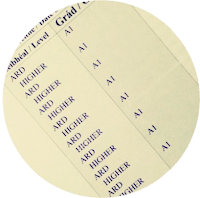You may also like: HPAT practice exam with worked solutions and guide to HPAT (only €19).
Top tips from Saidhbhe who achieved the 98th percentile in the HPAT 2023
My top tips for acing a HPAT exam: Section one
Section One basically tests how sound your logic is, and how fast you can reason effectively to solve the problem that they’ve given you. The key for this section is to not get stressed and to know your time limits, i.e. for every 10 minutes you should be aiming to answer approximately 7 questions. This puts you under quite a lot of time pressure, especially since some of these questions take a lot of time to read and understand so it is so important to not get lost and look at the big picture.
You need to be answering all of the questions. If one question is taking too long and you are borrowing time from another potentially easier question you need to cut your losses and move on.
I used to always guess C for these questions if I had no clue, or guess between the answers I had not eliminated yet. You need to be so strict on yourself with this section, you may feel like you’re on the right track, and you might be, but some questions may take 5 minutes to reason the right answer, leaving you stuck for time at the end.
I can guarantee you that there will be a question that is way easier than the one you’re stuck on, but it will need the one minute or so that you’ve taken to try to solve the other one.
Leave no questions blank and you can always come back to the tricky ones if you have the time at the end. For this section, you need to know the difference between correlation vs causation, what makes a sound and logically reasoned argument and some basic maths- multiplication, division, addition, and subtraction.
In preparation for this section, you can look at some free HPAT questions online, or look at some resources online, and listen to arguments made for or against a motion and try and pick out where they’re confusing correlation and causation.
One example of correlation not meaning causation is the number of shark attacks and Ice cream sales in Australia. A hypothetical research group found that the more ice cream sales there were in a month, the more shark attacks were recorded. So clearly there was correlation between these two pieces of data. Does this mean that an increase in ice cream sales means that more people will be attacked by sharks? Absolutely not, as more people eating ice cream doesn’t cause more people to be attacked by sharks in Australia. More ice cream sales would be caused by good weather, and because of the good weather more people were more likely to be on the beach and in the water, where sharks could mistake them for what would usually be their food and attack them.
My top tips for acing a HPAT exam: Section two
My top tip for this part of the exam is to read, read and then read some more. Why? This part of the exam is all about language and understanding subtle differences between words and how they make someone feel.
I really recommend opinion pieces in the Irish Times and the Economist, as their writers used a lot of vocabulary that you wouldn’t use in your day to day life.
For this section, you need to know the difference between depressed and despondent, and about 100 other words used for emotions (one of my favourite activities, not) you need to know which words are appropriate for the situation that they give you, i.e. nobody feels infuriated over an argument with their siblings over who gets the front seat, but they might feel annoyed.
It’s also important in this section to look at punctuation. It gives massive clues to how people are feeling about a situation and also look at descriptions of their expressions and body language. ‘“I want you to listen to me” they said in a small voice with their head hung low’, gives us a completely different insight into what the character is feeling than ‘“I want you to listen to me!” they shouted while throwing their arms up in the air”’.
This section is an exercise in putting yourself in someone else’s shoes and thinking about how they are feeling, not how you would feel if you were in that situation yourself, which catches a lot of people out. This section is not one that you would usually find yourself stuck for time in.
My top tips for acing a HPAT exam: Section three
Section 3 of the HPAT is the shortest section of the exam, with 30 questions altogether.
The questions usually are patterns of squares, triangles or shapes that are easy to draw and you have to either pick the middle one of that sequence (unfortunately they will not be in the proper order), say what the next shape in the pattern would look like or what the missing segment of something will look like.
For this section some helpful tips and tricks are EJOT for the 5th 10th and 15th and 20th letters of the alphabet, tracking one element through each of the pictures and seeing how it behaves and then it’s easier to predict where it will be next, or if the shapes or pictures are time consuming or hard to draw assign them letters, eg “L” for lightning and “M” for mouse.
I used to write out ABCDE on my paper and then cross off the ones I knew were wrong, so it was easier to guess quickly if I was running out of time and to see which ones I had left to pick from.
There are loads of resources online for this topic and even if you go through old ACER (company that does the HPAT) or UKCAT (a sort of UK HPAT) papers there’s a lot of similar questions for you to practise.
This one is easy to improve on because there are only so many patterns that ACER can come up with to put on a question, e.g. for movements around a square, there are only 8 places an object can be (4 corners and 4 middle of the sides).
The most common patterns I found are objects moving one or two spaces at a time, or moving one space, then two spaces, then 3 spaces and then 4. There are a few youtube videos explaining and showing these concepts quite well.
FAQs: preparation for the HPAT
What is the best way to study for the HPAT?
Anna: Your preparation will depend on the materials you have available to you. I started by doing sets of questions at a time. The next day I would look over the solutions to see where I may have gone wrong.
There is no point in doing HPAT style questions if you do not spend the time trying to understand the solutions afterwards.

Michael: I’ve been told that you can’t study for the HPAT as it’s an aptitude test, but I believe this to be wrong. Our whole lives we’ve been taught to study in a particular way, sit exams in a particular way and answer questions in a particular way. Since we were in primary school, we were told to always get the answer by following the question to the end. In the HPAT, you don’t always have this privilege and so you have to train your mind to think in a faster, more logical and critical way. You have to train your mind like you would your body. Different people approach the HPAT in different ways, however, I found it most beneficial to dedicate some practice on separate sections every evening (this may seem like lot but everyone is different).
For example, I concentrate on Section 1 on Mondays, Section 2 on Tuesday, Section 3 on Wednesday. Whatever section needs extra attention, I look at that on Thursdays. On Fridays I don’t do any HPAT, you really need a break from it all! Over the weekends I do and correct one of the practice exams.
- You require a massive vocabulary for Section 2, so over the couple of months coming up to the exam, I’ve been noting any tough words I come across during the drills and exams. I’ve made a list using the website vocabulary.com. The website allows you to test yourself by showing you the definition of a word you put in your list and then asks you to choose the word it is defining. It’s extremely useful and free. All the words you learn will also help with your English essays. [Martina: I don’t necessarily agree with this. It’s only good use of time for people whose vocabulary is weak.]
- I found reading newspaper articles and trying to find wholes in the topic discussed to be helpful in developing your critical thinking and analysis, an extremely important skill for Section 1.
- It’s a good idea to get comfortable with converting fractions and ratios into decimals and percentages. This may sound basic, but it is the basics that could let you down when you’re under pressure. I found the book ‘Speed Mathematics’ by Bill Handley to be really helpful for finding little tips and ticks for fast multiplications, division, adding, and subtracting.
- It’s also advisable to familiarise yourself with the layout, timing, the different sections, the different types of questions and the HPAT answer sheet you will have to use on the day. Just knowing what you’re facing puts your mind at ease.
- Spend the most time going through the solutions. Knowing where you went wrong is so important.
Have a note book beside you and note things you got wrong, got right, misinterpreted, didn’t see, etc.
- Always give the questions you got wrong another try to get the right answer.
You figuring out where you went wrong is much more beneficial than being told.
- Try and meet up with someone else doing the exam to swap tactics, the way you approached questions and just general observations.
Do you really need to study for the HPAT or is it just an aptitude test?
- Section 1 measures a candidate’s problem-solving skills.
- Section 2 deals with a candidate’s ability to understand the emotions and thoughts of others.
- Section 3 draws on a candidate’s skills dealing with sequences and patterns.
Some students secure a place in medicine without preparing for the HPAT.
Many people go into the exam with these misconception and no preparation, some do well while others don’t, is it worth the risk? No.
Are there any places online that offer free sample tests and corresponding answers?
How long should I spend on each section of the HPAT?
Michael: Remember that Section 1 and 2 are worth 40% each, while Section 3 is only worth 20%, so this may impact your preparation times.
On the day you only have 65 minutes for Section 1, 45 minutes for Section 2 and 40 minutes for Section 3. When the time is over for the section, you cannot go back if you have spare time from another section.
What is the best way to study for Section 2?
Michael: There aren’t many ways to study for Section 2, you’re really just developing your ability to understand people. As I said earlier, the vocabulary is really important, so do concentrate on that, building it up as much as possible. Read lots in your spare time to get used to reading and concentrating on characters etc. Practice lots by doing drills, it’s the best way to improve. Cartoons have featured a lot over the last few years in Section 2, so look at ways to analyse those types of questions. Practice putting yourself in the situation presented in the passage, be empathetic and honest when answering the questions.
A few weeks before the HPAT, can I still improve my Section 3?
Anna: A lot of people note that preparation can significantly help them to improve their scores in Section 3. Section 3 deals with sequences and patterns. A person’s ability to identify patterns can improve with practice. Before the exam, I would practice doing Section 3 style questions and then go through the solutions.
Michael: Yes. There is always time to improve. I believe that Section 3 is the easiest to study for. Remember that Section 3 is only worth 20%. It is important to do well in it, but if it’s your worst section, that isn’t that bad. There are lots of different methods for answering Section 3 questions like 3-2, 2-2-1, mapping, counting and common base. Learn these methods and practice applying them to questions under the 75 second time limit. Certain patterns can be learned off as well as sequences like the Fibonacci sequence allowing you to spot the pattern fast.
Do you have any tips for improving reading speed for the Comprehension section?
The best advice is to push yourself, see how fast you can go while actually understanding the text. If you are a paragraph in and have no idea whats going, on start again. Those few seconds aren’t lost: they will help you in the long run with answering the question.
[Martina: there is no point in speed reading. Speed always means you lose the nuance. Nuance is the only thing they will ask you about. You stand to get more marks if you answer 80% of 10 questions than 50% of 12 questions.]
How do you balance the study between the mocks and HPAT?
Is the stress of the exam hyped up compared to what it is actually like?
I’m not going to lie: it is extremely stressful, but you really can’t let it get to you. Also, compared to the Leaving Cert, they are both high pressure exams with a lot depending on the results, so no wonder they are hyped up. The atmosphere in the test centre beforehand wasn’t very enjoyable. You could really see people struggling with the pressure.
Do you have any tips for the last few weeks in the run up to the HPAT?
As per the amount of time spent on preparation, it is best to focus on the amount of work you get done, not the time spent doing it.
There is no need to cram for the HPAT. You should go into the exam in a relaxed state of mind. Try to avoid potential stress triggers the week before the exam. Stay as relaxed as possible and try to stay positive. Being in a good frame of mind the week before the exam is key.
Don’t have a major meltdown, or if you feel like one is coming, step away from your preparation for an evening, relax, take your mind off it, talk to some and put your head down the next night. You will feel revitalised.
The week before the exam, take it easy. Go to bed early and get up early to get your mind accustomed to being active in the morning as the exam is in the morning. Sounds stupid, but it is a good tactic. I recommend doing one or two ACER exams the week before too as they are that little bit easier and will give you a confidence boost before the big day. The night before – collect yourself, don’t start doubting your abilities, make sure you have all the documentation printed off and ready for the morning.
When is a good time to start preparing for the HPAT? Is 5th year too early?
Anna: This depends on the individual. I started preparing in the September of sixth year.
The courses are expensive and you probably will have forgotten a lot by the time 6th year comes around, so maybe leave them until then. Also you could try an ACER exam to see the layout and everything. Use the extra time to come to terms with the exam, learn what you are good at and weak at too. If it’s possible, try to find out if there is anyone else in your year doing the HPAT. When 6th year comes, you should really try to form a study group. They are extremely beneficial and I can assure you that you will really learn a lot form others and how they approach questions.
FAQs: On the day of the HPAT
Does the registering process take ages on the day? How long before it starts should you be at the exam venue?
Michael: It really depends on the venue and the amount of people to be registered. It can be long and tedious. Be there as early as you can, sitting in your seat acclimatising to your surroundings is helpful before the exam. Check the ACER recommendation regarding arrival time (I don’t want to quote them in case it changes). Remember you can’t bring food into the actual hall, so have something before you go in. It can be a very long day.
Once everyone is registered things move quickly enough. They read out the rules, hand out the papers and then the answer sheets. They check your admission tickets again. Once it all starts, it flies by. There isn’t a substantial break between each section, so don’t expect to have time to compose yourself. Have your own timer with you: you may not be close to a clock on the wall.
Do you get rough work paper before the exam?
Michael: No, but you are allowed to write in the margins. At the beginning they say “you are not allowed to allowed to deface the booklet”. Some people think this means you cannot write on it, but that is wrong, you can. You are not allowed to rip it or anything like that.
On the day the only things you can bring in with you are your water bottle (clear with no labels), a rubber, some pencils, a stopwatch (that doesn’t beep), your admission ticket and your ID. [Please always check official ACER guidance]
No rulers or highlighters, you can bring in your phone, but it has to be off and left face down under your chair (or at least that was how it was in the test centre I was in).
FAQs: HPAT scores
What are the chances I will get the marks I need?
How do I calculate my HPAT score from a practice exam I did?
In short, it’s not possible.
Let’s say you got
Section 1 28/44 (63.6%)
Section 2 24/36 (66.7%)
Section 3 15/30 (50%)
You may think that you can calculate the percentages, and pop them into the formula below
Overall Score = [(2 x Section 1 + 2 x Section 2 + 1 x Section 3) ÷ 5] x 3.
However, that’s not how it works. What you just calculated is your raw score.
First, each of the HPAT – Ireland scores is expressed on a scale of 0 to 100. These are not percentage marks. Why? Because they are adjusted statistically (which is quite possibly a euphemism for bell-curved).
Second, there are “trial” questions on the HPAT. In other words, the examining body can remove certain questions even though you spent valuable time on them. Let’s say you got 28 questions right in your practice exam in Section 1. The examining body could decide that 2 of those questions are now invalid. This means that someone who dedicated their efforts to 2 other questions and succeeded now has an advantage over you when it comes to their score.
Because you’re not making these adjustments, you raw score is going to be different to the HPAT score.
The results you get in summer contain a HPAT score (out of 300, but it’s not your raw score) and a percentile, in other words where you ranked compared to other people.
What’s a good raw score in a practice HPAT?
70-80 is usually considered good. In reality, nobody knows because of the way the marking process is adjusted.
What is a good percentile in a practice HPAT?
You want to be scoring above 80, but again, there is no real answer to this question because the percentiles you are given compare you to a small, biased population that is practicing on the same package that you are practicing.
Is it better to do the HPAT while in 5th year or in 6th year?
You pretty much can’t do it in 5th year. You need to be a “bona fide candidate“. Otherwise, they can cancel your exam. Furthermore, the HPAT results are only valid for the same year.
This piece of research has found that repeating your HPAT improves your score, especially in Section 3 (the rules have changed since so it may not be as relevant, but it is a well known fact that people improve at IQ tests if they do lots of them).
How many people sit the HPAT?
There are no clear official figures, but based on various sources, I think it is around 3,500 students.
Does the HPAT pick out more empathetic candidates for medicine?
It’s hard to measure empathy, but this BMJ paper discussed in this article from the Independent suggests that it doesn’t.
How do doctors feel about the HPAT?
Any recommended reading if I am curious about a career in Medicine?
The culture
Atul Gawande – Being Mortal
Oliver Sacks – The Man Who Mistook His Wife for a Hat
Adam Kay – This Is Going to Hurt
Henry Marsh – Do No Harm
Paul Kalanithi – When Breath Becomes Air
Seamus O’Mahony – Can Medicine Be Cured?
The science
This is for a trip to the library. Names of suggested books are given as they are known among medical students.
Anatomy Atlas: Netter
Physiology: Sherwood
Biochemistry: Lippincott
Pharmacology: Rang and Dale
Clinical Medicine: Kumar and Clarke
Clinical Skills: Talley and O’Connor
I don’t think I will get the points. What are the alternatives?
Other than repeating, the alternatives are to go abroad or pursue graduate entry.
In my opinion, the unfortunate reality is that both alternatives are significantly more expensive and time-consuming than getting the points. For example, according to the GEM Debt Campaign, when GEMS students graduate they must immediately begin monthly repayments of up to €1,178 on loans taken out to fund their medical degree (The Irish Times). It would be a struggle to meet this on an entry-level doctor’s salary.
Having said that, there are lots of success stories from both routes.
Another point to consider is this: not speaking of the occupation, but of the medical degree itself, at least in Ireland, it relies on many of the same skills as the Leaving Cert. To do well in the degree, you will require encyclopaedic knowledge of many, many areas that will not be relevant to the area in which you choose to practice. Beyond the degree, speaking of career progression, many areas of medicine are quite academic or require getting over significant academic hurdles in the form of series of exams, additional degrees, such as M.Sc. and Ph.D., publishing papers, etc.
It is also entirely possible to get away from the more academic side of medicine once you are finished your degree, but even those areas are still probably quite academic by most people’s standards!
This is not to discourage anyone from pursuing their dream career, but rather inform you of the choices and challenges that may lie ahead, so that you make the decision that is right for you.
…
The questions above were answered by 3 students who have successfully sat the HPAT and some recently qualified doctors. We preferred to remain anonymous. The names are changed.
If you wish to contribute to the discussion, please email answer at 625points dot com
You may also like:
Five books to read before starting medical school






